This time, we’re introducing The Masterful Cat Is Depressed Again Today—a warm and quirky manga perfect for learners who want to enjoy slice-of-life Japanese through cute, relaxing episodes filled with both casual and polite expressions.
Work Information
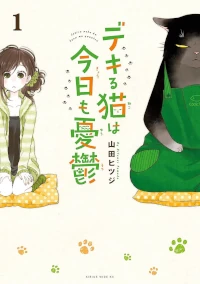
The Masterful Cat Is Depressed Again Today(デキる猫は今日も憂鬱)
Author: Hitsuzi Yamada
Publisher: KODANSHA
Amount of text: moderate
Challenge level: ★★
Latest volume : Vol.11(Apr.2025 / Ongoing)
Story overview
A charming 4-panel and short-form comedy that follows the delightfully happy daily life of Saku Fukuzawa, a 28-year-old office worker with zero life skills outside of her job, and Yukichi, a large, ultra-capable cat she rescued as a kitten when he was on the verge of freezing to death.
Their heartwarming one-woman-and-one-cat lifestyle is currently a hit on Nico Nico Seiga and Pixiv Comic!
The Appeal of This Manga
What makes this manga so charming is its unique world—a strangely peaceful setting where a cat who has grown to human (or bear!) size supports his owner in every aspect of daily life. Yukichi’s incredible skills and size are clearly beyond normal feline behavior, yet he somehow fits right into the world around him. His loving devotion to Saku is touching, and Saku’s deep gratitude, even as she relies on him more than she should, makes their bond feel genuine and sweet. Their relationship—a mix of support, affection, and quiet humor—is the emotional core of this offbeat but lovable story.
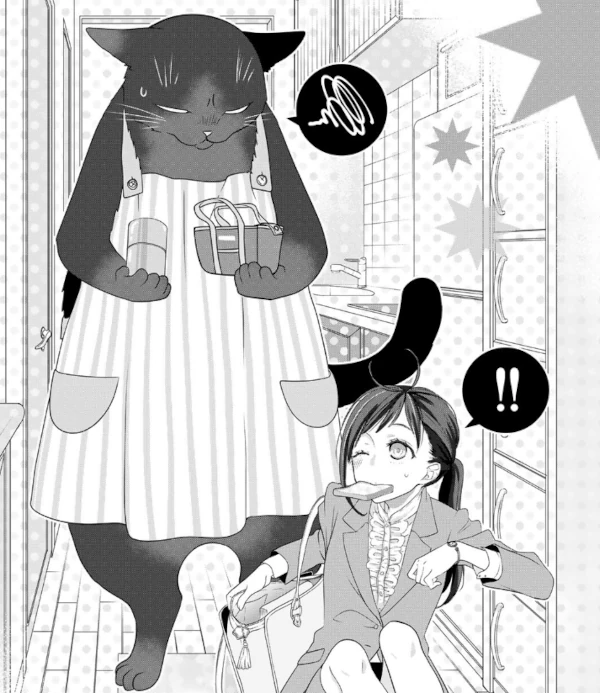
Why this manga is suitable for learning Japanese
This manga is not only entertaining but also highly recommended for Japanese learners for several reasons.
Natural Japanese in Work and Private Settings
The manga features scenes from Saku’s life at the office as well as her conversations with Yukichi at home, offering great examples of both polite speech and casual everyday talk. This makes it especially useful for learners who want to get a feel for real-life conversational Japanese in different contexts.
Every kanji character in the manga is accompanied by furigana (reading aids), which makes it particularly accessible for beginners who are still mastering kanji reading.
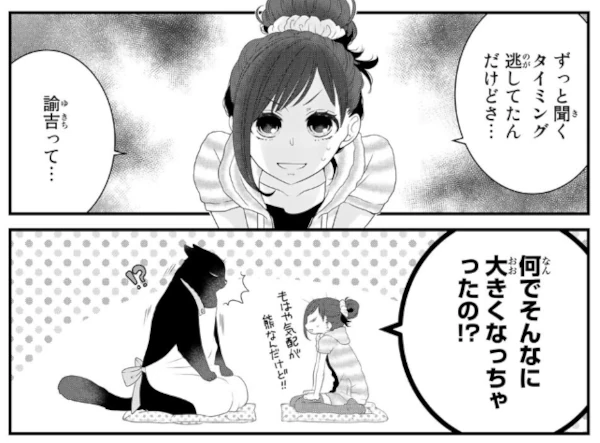
Easy-to-Read 4-Panel Format
The story is told in 4-panel (yonkoma) format, with one short episode per page. This makes it ideal for casual reading or study breaks, and easy to follow even if you’re short on time.
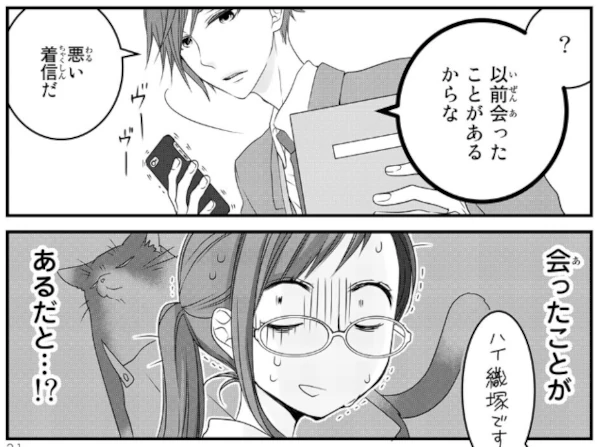
Phrase Spotlight
From Bento Boxes to Beauty : What “Joshi Ryoku” Tells Us About Japan女子力(じょしりょく)
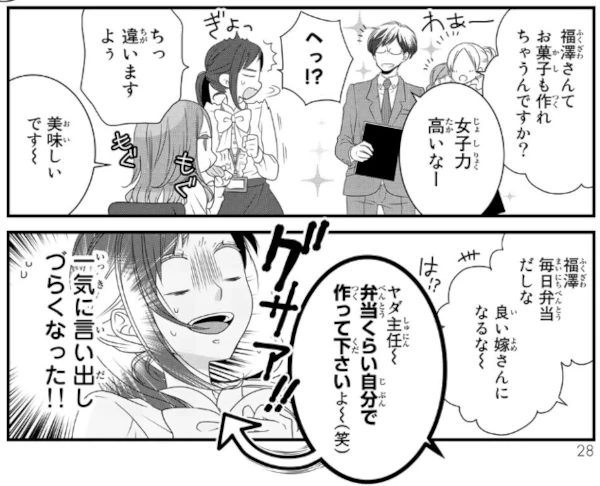
In a scene from a romantic comedy manga, a character blushes when someone compliments her cooking:
「えっ、すごい女子力……!」
“Wow, that’s some serious joshi ryoku…!”
This kind of praise may sound flattering, but what exactly does joshi ryoku mean—and why is it used so often in Japan?
What Is Joshi Ryoku?
The term 女子力 (joshi ryoku) is made up of two parts:
・女子 (joshi) — “young woman” or “girl”
・力 (ryoku) — “power” or “ability”
Literally, it means “girl power,” but unlike the Western feminist slogan, the Japanese version often refers to domestic or lifestyle skills traditionally associated with femininity. Examples of high joshi ryoku include:
・Being able to cook or bake well
・Dressing stylishly and doing good makeup
・Having neat handwriting or a tidy home
・Offering thoughtful gifts or caring for others
It’s a flexible term used widely in casual conversations, marketing, and even self-help media. People might say:
「このお弁当、女子力高い!」
“This homemade lunch shows high joshi ryoku!”
Or:
「最近、女子力を上げたいと思ってて…」
“Lately, I’ve been trying to improve my joshi ryoku…”
Between Social Pressure and Personal Aspiration
While joshi ryoku can function as a lighthearted compliment or a form of self-expression, it also reflects deeper social pressures—especially for women. In modern Japan, many women grow up exposed to media, advertising, and peer norms that equate being desirable or successful with displaying high joshi ryoku. Over time, this can lead to internalized expectations: rather than feeling externally pressured, some women come to believe that they should want to be more “feminine,” more skilled at homemaking, more aesthetically pleasing—because that’s what a “good woman” is supposed to be.
This self-imposed pressure often appears in everyday expressions like:
「女子力、もっと上げなきゃ…」
“I really need to work on my joshi ryoku…”
Even when not directly asked to, many women feel they must live up to these ideals to be accepted socially, romantically, or even professionally. In this way, joshi ryoku functions not just as a cultural concept, but as a subtle form of internal discipline—encouraging conformity under the guise of self-improvement. Recognizing this tension is key to understanding how language can shape not only how people are perceived by others, but how they perceive themselves.
A Common Theme in Manga and Anime
In manga and anime, joshi ryoku often pops up as a character trait or a moment of unexpected admiration. A tomboyish heroine surprises classmates with her baking skills. A quiet girl wins hearts by bringing handmade bento to school. These moments often lead to lines like:
「えっ、〇〇って女子力高いんだ!」
“Whoa, I didn’t know ○○ had such high joshi ryoku!”
Such scenes help readers understand not just the definition of the term, but also its emotional and social weight—pride, envy, surprise, or attraction.
Summary
TWhile joshi ryoku (“feminine power”) is often used playfully to praise skills like cooking or fashion sense, it also reflects deeper social expectations. In Japan, many women internalize the idea that being desirable means cultivating high joshi ryoku—not just for others, but as a personal goal. Phrases like 「女子力、もっと上げなきゃ…」 (“I need to work on my joshi ryoku…”) show how these ideals can become self-imposed pressures.
For Japanese learners, understanding joshi ryoku is more than just learning a trendy word—it offers insight into gender norms, self-expression, and how casual language can carry deeper cultural weight. Recognizing these nuances can deepen learners’ cultural fluency and awareness of how language reflects social values in modern Japan.
A Little Warning
A Bit Too Fantastic?
The premise—a human-sized cat who takes care of all the housework—leans heavily into fantasy. While the tone is gentle and wholesome, readers looking for realistic slice-of-life stories may find it a bit too far-fetched.
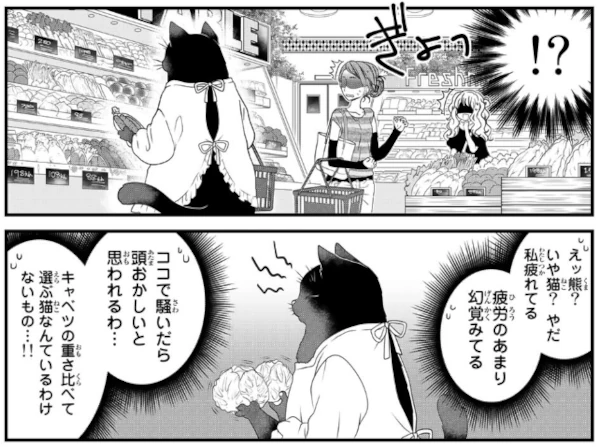
Work Information

The Masterful Cat Is Depressed Again Today(デキる猫は今日も憂鬱)
Author: Hitsuzi Yamada
Publisher: KODANSHA
Amount of text: moderate
Challenge level: ★★
Latest volume : Vol.11(Apr.2025 / Ongoing)
Here’s a safe and convenient way to purchase Japanese manga.
This Blog’s ConceptIn this blog, we are introducing manga that are not only highly captivating but also ideal for Japanese language learners. Studying Japanese through manga is both fun and effective. Manga allows you to understand the subtleties of keigo (honorifics), teineigo (polite speech), and casual conversation in Japanese. We hope you find works that match your interests and use them to enhance your Japanese learning journey.